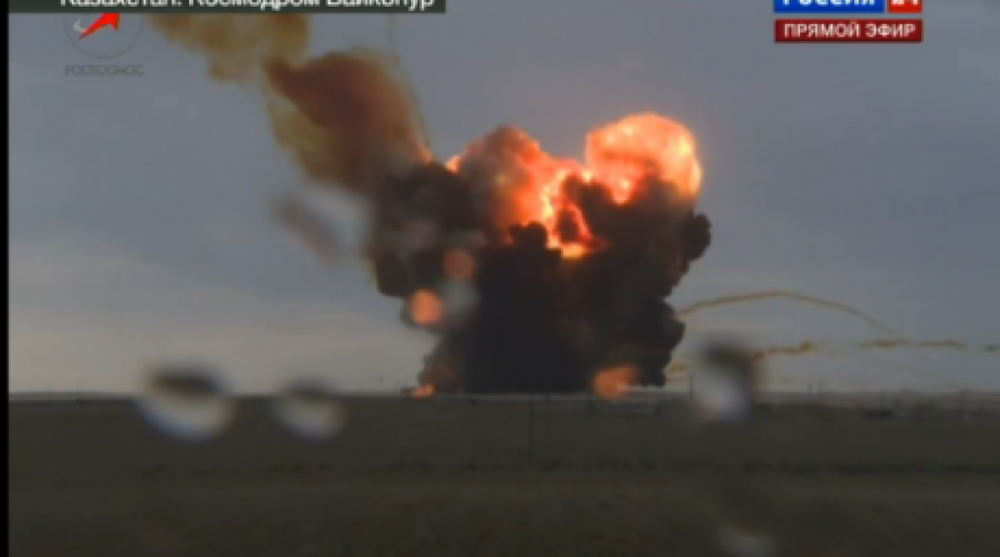
Russia’s Proton-M carrier rocket [equipped with a DM-3 booster] carrying three Glonass-M navigation satellites crashed right after the lift-off at Kazakhstan-based Baikonur cosmodrome, RIA Novosti reports. The satellites were to reach the orbit in 6 hours from the start. No immediate reports of causalities have been forthcoming. The Proton-M is a Russian carrier rocket derived from the Soviet-developed Proton. It is built by Khrunichev, and launched from sites 81 and 200 at the Baikonur Cosmodrome in Kazakhstan. GLONASS is a radio-based satellite navigation system operated by the Russian Aerospace Defence Forces. It both complements and provides an alternative to the United States' Global Positioning System (GPS) and is the only alternative navigational system in operation with global coverage and of comparable precision. Citing an unidentified source, RIA Novosti reports that launches from Baikonur will be suspended for the following 2-3 months. The official explanation of the causes is to be voiced in the days to come. “Such incidents have already taken place. I think launches will be resumed in 2-3 months’ time”, he said. According to Eurasia insurance company, the rocket carrier contained almost 500 tons of toxic fuel consisting of heptyl and amyl. Baikonur is the first and largest cosmodrome in the world. Located in Kazakhstan, it is rented out to Russia till 2050. Baikonur is closer to the Equator than other launch sites – a situation that facilitates geostationary orbit or orbits less inclined to reach the International Space Station (ISS). This privileged geographic placement enables the launch of more significant payloads. The cosmodrome has been rented out since 1994. Annual rent stands at $115 million. The town accommodates over 70 000 people, with 37% being Russia’s citizens. About 4 000 Russia’s citizens are here almost permanently on business trips to facilitate space launches. The town budget receives over 1 billion roubles a year from the Russian federal budget. Russia’s Roskosmos Federal Space Agency spent over $33.3 million in 2012 to maintain infrastructure and space facilities at the Kazakhstan-based Baikonur cosmodrome, Interfax-Kazakhstan reported February 1, 2013, citing Yuzhny Space Center Evgeniy Anissimov as saying.





Russia’s Proton-M carrier rocket [equipped with a DM-3 booster] carrying three Glonass-M navigation satellites crashed right after the lift-off at Kazakhstan-based Baikonur cosmodrome, RIA Novosti reports.
The satellites were to reach the orbit in 6 hours from the start. No immediate reports of causalities have been forthcoming.
The Proton-M is a Russian carrier rocket derived from the Soviet-developed Proton. It is built by Khrunichev, and launched from sites 81 and 200 at the Baikonur Cosmodrome in Kazakhstan.
GLONASS is a radio-based satellite navigation system operated by the Russian Aerospace Defence Forces. It both complements and provides an alternative to the United States' Global Positioning System (GPS) and is the only alternative navigational system in operation with global coverage and of comparable precision.
Citing an unidentified source, RIA Novosti reports that launches from Baikonur will be suspended for the following 2-3 months. The official explanation of the causes is to be voiced in the days to come. “Such incidents have already taken place. I think launches will be resumed in 2-3 months’ time”, he said.
According to Eurasia insurance company, the rocket carrier contained almost 500 tons of toxic fuel consisting of heptyl and amyl.
Baikonur is the first and largest cosmodrome in the world. Located in Kazakhstan, it is rented out to Russia till 2050.
Baikonur is closer to the Equator than other launch sites – a situation that facilitates geostationary orbit or orbits less inclined to reach the International Space Station (ISS). This privileged geographic placement enables the launch of more significant payloads.
The cosmodrome has been rented out since 1994. Annual rent stands at $115 million.
The town accommodates over 70 000 people, with 37% being Russia’s citizens. About 4 000 Russia’s citizens are here almost permanently on business trips to facilitate space launches. The town budget receives over 1 billion roubles a year from the Russian federal budget.
Russia’s Roskosmos Federal Space Agency spent over $33.3 million in 2012 to maintain infrastructure and space facilities at the Kazakhstan-based Baikonur cosmodrome, Interfax-Kazakhstan reported February 1, 2013, citing Yuzhny Space Center Evgeniy Anissimov as saying.

 +7 (777) 001 44 99
+7 (777) 001 44 99















































